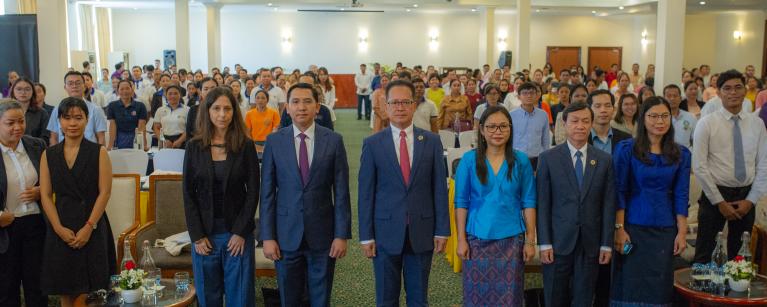Oxfam, together with the Ministry of Environment and partner organisations, co-organized “Ensuring Occupational Safety and Health in the Climate Change Context for Women Workers and Farmers in Agri-Food Sector” in Phnom Penh on 31 May 2024 in Phnom Penh. This workshop aims to raise awareness and creates a space for policy dialogue to understand challenges and find solutions amongst specialists, policy makers, and government representative and development partners, with representatives of women workers and farmers in Cambodia’s agri-food sector.
Oxfam National Director, Ms. Sophoan Phean, said, “Oxfam’s mission is to contribute to building a society that is free of poverty and injustice. We are committed to collaborating with and supporting the Royal Government of Cambodia and relevant stakeholders in diminishing poverty and addressing inequality among workers, vulnerable population groups, and households with financial difficulties.Enhancing occupational safety and health for women workers and farmers in Cambodia's agri-food sector yields substantial economic benefits. Improved OSH standards reduce workplace injuries and illnesses, leading to higher productivity and reduced avoidable medical costs. Healthier workers are more efficient, contributing to better quality and higher yields in agricultural output. It helps strengthen their resilience amidst the growing impacts of climate changes and global warming, thus lifting them from poverty.”
Based on the research from the International Labour Organization (ILO) on “Safety and Health in Climate Change” in 2024, the impact of climate change will negatively affect the safety and health of workers. This includes exposure to excessive heat, ultraviolet radiation, extreme weather events, workplace air pollution, vector-bone diseases and changes in agrochemical use. The research has shown that women workers face greater challenges than before due to their roles as farmers and the impact on their life cycle, including the affect of unsuccessful pregnancies. Informal economy and self-employed workers are among those most at risk from the impact of climate change. This is due to a lack of safety and heathcare, limited access to public services and insufficient support systems. These vulnerable workers cannot easily quit their jobs, even when their health is severely at risk from climate change impacts, as they rely on the income to support their family.
Occupational Safety and Health (OSH) in Cambodia has been developing steadily in recent years, driven by the country's rapid economic growth, industrialization, climate changes and global warming, and the continued commitment of the Royal Government of Cambodia to improve labour protection. The Ministry of Labour and Vocational Training (MoLVT) oversees OSH regulations, focusing on improving working conditions, particularly in the garment and construction sectors.
Despite legislative efforts, challenges remain, such as limited enforcement capacity, insufficient training, and a high incidence of workplace accidents. There are several specialized and development partners support Cambodia's efforts by providing technical assistance on policy formulation, training, and promoting best practices, including ongoing reforms aimed at enhancing OSH standards to ensure safer working environments for Cambodian workers. Nevertheless, OSH for women workers and farmers in agri-food sector remains a fundamental challenge and has gained little policy traction over the years.
The workshop will be attended by 270 dignitaries and representatives from government ministries, development partners, think tanks and researcher communities, members of CSOs, and representatives of women workers and farmers in Cambodia’s agri-food sector. After the conclusion of the workshop, Oxfam will produce the report and later submit to the Royal Government of Cambodia through the Ministry of Environment, the Ministry of Agriculture, Forestry and Fisheries, and the Ministry of Labour and Vocational Training for policy intervention and improvement of OSH.
Ms. Naratevy Kek, Media and Communications Manager, Oxfam
Naratevey.kek@oxfam.org
In Cambodia, occupational safety and health (OSH) for women workers and farmers in the agri-food sector is a critical concern. While workers globally are affected by climate change, some face unique exposure risks. Women in subsistence agriculture, like banana plantation, are particularly vulnerable due to their specific job roles and life stages; pregnancy-related complications such as hypertension, miscarriages, and stillbirths are significant risks. Informal economy workers are among the most at risk from climate change hazards, often lacking OSH protections, essential services, and infrastructure. More importantly, financial constraints frequently prevent informal and self-employed workers from stopping work, even when extreme climate events threaten their health.
It's essential to raise awareness and create a space for policy dialogue. Key stakeholders in promoting OSH for women workers and farmers in Cambodia's agri-food sector include the Ministry of Environment, the Ministry of Agriculture, Forestry and Fisheries, and the Ministry of Labour and Vocational Training, and Ministry of Health which develop and enforce regulations. International NGOs and development partners have provided technical assistance and advocated for best practices. Local NGOs and women's rights groups play a crucial role in raising awareness and supporting grassroots initiatives and advocacy. Moreover, employers and agricultural cooperatives are also essential for implementing OSH measures on the ground. And the community leaders and workers themselves are vital forces for ensuring compliance and fostering a culture of safety through redress complaint mechanism and collective bargaining representatives.
Enhancing OSH for women workers and farmers in Cambodia's agri-food sector yields substantial economic benefits. Improved OSH standards reduce workplace injuries and illnesses, leading to higher productivity and reduced medical costs. Healthier workers are more efficient, contributing to better quality and higher yields in agricultural output. Moreover, ensuring safe working conditions attracts more women to the sector, bolstering labour supply and promoting gender equality. Enhanced OSH practices also foster a more sustainable and resilient agri-food sector, which is vital for Cambodia's economic growth and food security. Overall, investing in OSH leads to long-term economic stability and development.
The Royal Government of Cambodia, through the Ministry of Labour and Vocation Training, has launched an action plan for 2024 aiming to improve occupational safety and health for all workers. This action plan is also in line with the government’s policy flagship 2023-2028 “Pentagonal Strategy”, and the Strategic Plan for Employment, Social Security and Vocational Training 2024-2028 where human capital and work force development is the immediate priority of the government.
